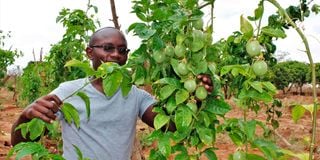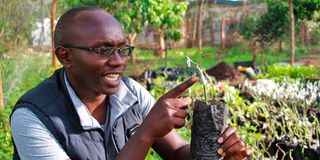Breaking News: Former Lugari MP Cyrus Jirongo dies in a road crash
Premium
University student carves a niche in purple passion fruits

Dennis Nguma at his passion fruit farm in Mavindini, Makueni County.
Mavindini is among the driest regions in Makueni but passion fruit plants turn heads at Dennis Nguma’s home on the road to Kathonwezi.
The enterprise stands out as everyone else grows maize, beans and pigeon peas.
The 29-year-old agriculture economist is overseeing two workers picking the fruits and placing them in crates, the first step in their journey to fresh juice lovers in Nairobi when we visit.
“The fruits are harvested every day to stop ripe ones from falling. We retain the bud during harvesting to increase the shelf life of the fruit,” Nguma says during a tour of the quarter-acre farm.
Though purple passion fruit is adapted to cool climates, it does well in Mavindini, thanks to grafting.
“We raise the yellow passion fruit in the nursery and use it as the rootstock as it is hardy. Three months after germination, it is grafted with the purple passion fruit scion. The result is a tree which is adapted to drought. We recommend mature scions as the fruits mature fast,” Nguma says.
Orchard set up
Setting up an orchard starts with ploughing and levelling the field.
“Transplanting takes place a month after grafting. Flowering begins almost immediately since the scions are from mature plants. We use poles and wires for the tendrils to attach themselves,” Nguma says as he points to 60cm by 60cm zai pits where the plants stand.
“The pits are 30cm deep. A mixture of manure and top soil fills a pit to three-quarters. The remaining bit is for water and mulch. Spacing from plant to plant is three metres and 1.5 metres between rows.”
Harvesting starts when plants are seven to eight months old and doesn’t stop until they are four years old. Peak production begins after a year since the plant will have many branches.
Agronomists advise farmers to prune the trees periodically as that spurs production.
Nguma goes for disease-free seedlings. He has installed pheromone traps for fruit flies.

Dennis Nguma with a passion fruit seedling at his farm in Mavindini, Makueni County.
“To battle thrips, a notorious pest during the dry spell, we spray regularly with copper-based fungicides. The chemical also kills anthracnose, a fungal disease. Fusarian wilt is prevented by disinfecting pruning tools and destroying infected plants,” he says.
Nguma’s lowest moment was helplessly watching his crops wither due to drought. That was in 2020 when he thought a water pan at one corner of the farm would be of help.
Things improved when he sunk a well in December 2021. The well sustains 1,000 passion fruit trees all year round. He uses drip irrigation to minimise water loss.
To enhance fruit formation and income, Nguma has five hives near the orchard.
“Our plan is to increase the hives to 30,” he says.
Harvest
Two months to the orchard’s first anniversary when production is expected to peak, Nguma harvests 20 kilos of fruits, selling a kilo at Sh100 to a Nairobi client.
Passion fruits contain carbohydrates and vitamins A and C. The purple variety is in higher demand because of its aroma. Its juice is less acidic compared to the yellow variety.
“I expect to start harvesting more than at least 500 kilos a week,” Nguma says.
Nguma uses the bulk of the income to support his masters degree course in agricultural and applied economics.
The horticulture bug bit Nguma when he was midway through the course at the University of Nairobi but the pandemic disrupted his studies.
He ventured into papaya farm but the business took a twist when Nguma visited a friend growing purple passion fruits.
He quickly phased out papaws and plunged headlong into passion fruit farming.
Nguma has also become a consultant. He advises farmers on setting up and managing orchards.
He also champions the uptake of purple passion fruit by selling seedlings. A website, social media, shows during fairs and word of mouth help Nguma sustain the business.





